*NURSING > QUESTIONS & ANSWERS > Nursing Today Transition & Trends 8th Edition, JoAnn Test Bank (Chapter 05: NCLEX-RN® Examination a (All)
Nursing Today Transition & Trends 8th Edition, JoAnn Test Bank (Chapter 05: NCLEX-RN® Examination and the New Graduate)
Document Content and Description Below
Chapter 05: NCLEX-RN® Examination and the New Graduate MULTIPLE CHOICE 1. The graduate nurse understands the purpose of the NCLEX-RN® exam when stating which of the following? a. “The exam... provides feedback to the candidate regarding areas of weakness in nursing practice.” b. “The exam determines the candidate’s ability or inability to meet minimum standards for safe practice.” c. “The exam gives employers an opportunity to hire graduates who have scored highest among first-time licensure candidates.” d. “The exam prepares new graduates as efficient, effective staff nurses.” 2. Which statement by the nursing professor is accurate about the NCLEX-RN® exam? The purpose of the NCLEX-RN® test plan is to ensure that all a. “test takers answer items of comparable difficulty.” b. “test takers answer approximately the same number of items.” c. “test items are job related.” d. “clinical specialties will be equally represented.” 3. In trends class, a student tells the instructor, “I don’t think I can possibly pass the NCLEX-RN®. I hated psych nursing, but now I’ve heard that a huge amount of the NCLEX® is psych related.” What is the best response from the instructor? a. “Perhaps you should consider retaking the psychiatric nursing course.” b. “There are equal numbers of questions related to each aspect of client needs.” c. “Psychosocial integrity is the basis for 6% to 12% of the examination.” d. “You will need to take a review course in which they teach psychiatric nursing principles.” 4. Which statement indicates the graduate nurses understanding of the process at the NCLEX® testing site? a. “I will be thumbprinted and photographed.” b. “I will be placed in a locked testing cubicle.” c. “I will answer 300 test questions.” d. “I will be given some questions as a paper-and-pencil test.” 5. Which statement made by the graduate nurse indicates understanding of the NCLEX-RN® exam passing score? a. “Candidates seeking licensure in California and New York must score higher.” b. “The passing score is the same for licensure in all states.” c. “Candidates from BSN programs must score one standard deviation higher than the ADN graduates.” d. “ADN graduates must answer 80% of the 265 questions correctly to pass.” 6. What type of nursing position would most likely provide experience in the type of nursing situations upon which the NCLEX® Exam questions are based? a. Home care nurse b. Psychiatric staff nurse c. Staff nurse in an ambulatory pediatric clinic d. Staff nurse in a medical-surgical inpatient unit 7. What is the best review strategy to use to prepare for the NCLEX-RN® Exam? a. Spend about 8 hours a day on your days off until you take the examination. b. Study for 4 hours a night while taking a 2-week review course. c. Review basic nursing content 2 to 3 hours a day 3 days a week for 5 to 6 weeks. d. Study 10 hours on the day and evening before the examination. . 8. What are helpful strategies for dealing with test anxiety? a. Put as much time as possible into studying. b. Practice relaxation techniques and positive thinking. c. Use review books and tapes. d. Focus on test-taking skills and emphasize facts less. 9. Which of the following statements indicate the nurses understanding of the content of the NCLEX® Exam? a. “The exam is based on a practice analysis conducted by the National Council of State Boards of Nursing.” b. “The exam is a survey of nursing faculty regarding areas of importance for testing.” c. “The exam includes questions based on the National League of Nursing survey reports.” d. “The exam includes contributions from all of the member boards of the National Council.” 10. The graduate nurse is preparing to take the NCLEX-RN® Exam. Which blueprint category is interpreted as having the highest percentage of test items? a. Safe, effective care environment c. Psychosocial integrity b. Physiological integrity d. Health promotion and maintenance 11. The nurse interprets “computer adaptive testing (CAT)” to mean a. questions are selected, and the exam is adapted to the candidate’s previous responses. b. the test has been “adapted” to be administered via the computer. c. the test is adapted to decrease the total number of questions. d. questions are adapted to meet the practice analysis survey of the graduates. 12. The graduate nurse has an adequate understanding of the Authorization to Test when stating: a. “The Authorization to Test arrives at the beginning of the last semester of nursing school.” b. “The Authorization to Test arrives when the last day of clinical experience is complete.” c. “The Authorization to Test arrives upon completion of all of the state and national applications.” d. “The Authorization to Test arrives when all course work and applications have been completed and approved.” 13. The nurse interprets the Nurse Licensure Compact as a. an agreement between all states to recognize the license of all graduate nurses. b. an intrastate agreement for the nurse to practice in any area within the state. c. an agreement between the state boards of nursing and the National Council regarding foreign nurses. d. an agreement between compact states to recognize licensure from member states. 14. The nurse interprets the role of the individual state boards of nursing in the NCLEX® Exam as which of the following? a. To coordinate with the National Council State Boards of Nursing in administering the examination and licensing candidates to practice in respective states b. To prepare a licensure examination that is reflective of entry-level practice in their respective states c. To grade the examination, advise students of the results, and transmit all results to the National Council State Boards of Nursing for their files d. To supervise and administer the examination to the candidates within their state jurisdictions 15. The graduate nurse understands the process of NCLEX-RN® Exam scoring and reporting when stating: a. “The NCLEX-RN® Exam is scored on a pass/fail basis and is reported directly to the candidate.” b. “The candidate must score 80% or higher to be considered competent; scores are reported to the school.” c. “If the candidate must answer more than 365 questions, he or she will not pass the examination; scores are reported to the board of nursing.” d. “Scoring is based on the level of difficulty of the questions presented to the candidate; scores are reported to the candidate.” 16. A candidate has scheduled to take the NCLEX® Exam and has a family emergency before the scheduled date. What is the best action for the candidate to take? a. Call the respective state board of nursing and request a change in the testing date. b. Call the Candidate Services office at least 24 hours or 1 business day before the scheduled testing day. c. Call the school and request that someone notify the board of nursing regarding your change in schedule. d. It is not necessary to notify anyone regarding rescheduling the testing date; it will be rescheduled automatically. 17. A graduate nurse has arrived at the testing center when realizing that the required ATT form is missing. Explain what events would happen next. a. The testing center staff would not be able to look up his ATT online. b. The testing center staff would not allow him to test without his ATT. c. The graduate nurse could be admitted to the testing center with a photo ID. d. The testing center staff would call the NCSBN for verbal approval to let the graduate nurse test. 18. What would happen if the graduate nurse failed the NCLEX-RN on the first testing attempt? a. The graduate nurse would be required to take an additional nursing course before retesting. b. The graduate nurse would be required to wait 9 months to retest. c. The graduate nurse would be required to wait 45 to 90 days before retesting. d. The graduate nurse would not be allowed to test again. 19. A graduate nurse is planning to travel to a testing site and will need to have overnight accommodations. Which of the following is the best action for this graduate nurse to take to make the stay a success? a. Share a room with the 4 other graduate nurses planning to test at the same testing center. b. Stay up late studying. c. Room alone or with someone who is supportive of a positive environment. d. Room with another graduate nurse who frequently complains. 20. To adequately prepare for the NCLEX-RN® examination, which action by the graduate nurse is advised? a. Begin planning early at least 6 months ahead. b. Begin planning no more than 3 months ahead. c. Wait for the state board of nursing to contact the applicant about filing deadlines. d. Call the state board of nursing every week to set up a testing time. MULTIPLE RESPONSE 1. A nursing professor is preparing students for the NCLEX-RN® Exam. Which of the following items should the professor inform the students to expect on the exam? (Select all that apply.) a. Multiple choice questions with one correct answer b. Drag and drop questions into an ordered response c. True/false questions d. Graphic questions with a hot spot to identify an area e. Questions with an audio component where you need to wear a headset to listen f. Questions where you select the correct answer from the graphics presented at the end of the question 2. Which actions by the graduate nurse can help reduce anxiety on testing day? (Select all that apply.) a. Drive to the testing site the day before. b. Evaluate traffic. c. Wait until testing day to drive to the testing site. d. Drive to the hotel the day before. e. Locate the parking area at the testing site. 3. What actions will help prepare the graduate nurse for testing success? (Select all that apply.) a. Dress comfortably. b. Stay up late for last-minute studying. c. Eat a balanced breakfast. d. Have identification needed for entrance into the exam. e. Celebrate your success with friends the night before. 4. What questions should the graduate nurse ask themself when determining which NCLEX-RN® examination review course is right for the graduate? (Select all that apply.) a. What review courses are easily accessible? b. What review courses will teach me what I need to know? c. How well do I study at the computer? d. Can I plan a study review schedule and stick to it? e. Can I plan study time? 5. What actions by the graduate nurse will assist with finding the best NCLEX-RN® review book for personal study needs? (Select all that apply.) a. Check the number of pages in various subjects in the material. b. Look up several common topics in the index. c. Look for a book with information that has come out in the past month. d. Look for a book that focuses on nursing concepts. e. Look for a book that focuses on the delivery of safe patient care. 6. What are acceptable forms of identification at the testing center? (Select all that apply.) a. U.S. driver's license b. U.S. state-issued identification c. Credit or debit card with photo identification. d. Passport e. U.S. military identification f. School or university picture identification Zerwekh: Nursing Today, 7th Edition Chapter 05: NCLEX-RN® Examination and the New Graduate Test Bank MULTIPLE CHOICE 1. What is the purpose of the NCLEX-RN® Exam? a. To provide feedback to the candidate regarding areas of weakness in nursing practice b. To determine the candidate’s ability or inability to meet minimum standards for safe practice c. To give employers an opportunity to hire graduates who have scored highest among first-time licensure candidates d. To prepare new graduates as efficient, effective staff nurses 2. The purpose of the NCLEX-RN® test plan is to ensure that all: a. Test takers answer items of comparable difficulty. b. Test takers answer approximately the same number of items. c. Test items are job-related. d. Clinical specialties will be equally represented. 3. In trends class, a student tells the instructor, “I don’t think I can possibly pass the NCLEX-RN®. I hated psych nursing, but now I’ve heard that a huge amount of the NCLEX® is psych-related.” What is the best response from the instructor? a. “Perhaps you should consider retaking the psychiatric nursing course.” b. “There are equal numbers of questions related to each aspect of client needs.” c. “Psychosocial integrity is the basis for 6% to 12% of the examination.” d. “You will need to take a review course in which they teach psychiatric nursing principles.” 4. What can the candidate expect at the NCLEX® testing site? a. To be thumb-printed and photographed b. To be placed in a locked testing cubicle c. To answer 300 test questions d. To be given some questions as a paper-and-pencil test . 5. Which is a true statement about the NCLEX-RN® Exam passing score? a. Candidates seeking licensure in California and/or New York must score higher. b. The passing score is the same for licensure in all states. c. Candidates from BSN programs must score one standard deviation higher than the ADN graduates. d. ADN graduates must answer 80% of the 265 questions correctly to pass. . 6. What type of nursing position would most likely provide experience in the type of nursing situations upon which the NCLEX® Exam questions are based? a. Home care nurse b. Psychiatric staff nurse c. Staff nurse in an ambulatory pediatric clinic d. Staff nurse in a medical-surgical inpatient unit 7. What is the best review strategy to use to prepare for the NCLEX-RN® Exam? a. Spend about 8 hours a day on your days off until you take the examination. b. Study for 4 hours a night while taking a 2-week review course. c. Review basic nursing content 2 to 3 hours a day 3 days a week for 5 to 6 weeks. d. Study 10 hours on the day and evening before the examination. 8. What are helpful strategies for dealing with test anxiety? a. Put as much time as possible into studying. b. Practice relaxation techniques and positive thinking. c. Use review books and tapes. d. Focus on test-taking skills and emphasize facts less. ANS: B Put yourself in charge of your feelings. Replace those negative thoughts and ideas with posi-tive ones. Picture yourself succeeding. Give yourself permission to take some breaks—studying all of the time will increase anxiety. 9. What is the content of the NCLEX® Exam based on? a. A practice analysis conducted by the National Council of State Boards of Nurs-ing b. Survey of nursing faculty regarding areas of importance for testing c. National League of Accreditation survey reports d. Contributions from all of the member boards of the National Council ANS: A The National Council conducts a practice analysis to determine what is being required of new graduates. The test plan for the NCLEX® is based on this research. 10. Which NCLEX-RN® Exam blueprint category has the highest percentage of test items? a. Safe, effective care environment b. Physiological integrity c. Psychosocial integrity d. Health promotion and maintenance ANS: B The area of physiology makes up about 50% of the test plan. This is the area that covers basic nursing care, pharmacology, and prevention of complications. 11. What does “computer adaptive testing (CAT)” mean? a. Questions are selected and the exam is adapted to the candidate’s previous re-sponses. b. The test has been “adapted” to be administered via the computer. c. The test is adapted to decrease the total number of questions. d. Questions are adapted to meet the job analysis survey of the graduates. ANS: A Questions are selected for each candidate based on the test plan. When a candidate misses a question, the computer will present an easier question from that same category. 12. When is the Authorization to Test received? a. At the beginning of the last semester of nursing school b. When the last day of clinicals is complete c. On completion of all of the state and national applications d. When all course work and applications have been completed and approved 13. What is the Nurse Licensure Compact? a. An agreement between all states to recognize the license of all graduate nurses b. An intrastate agreement for the nurse to practice in any area within the state c. An agreement between the State Boards of Nursing and the National Council re-garding foreign nurses d. An agreement between compact states to recognize licensure from member states 14. What is the role of the individual state boards of nursing in the NCLEX® Exam? a. To coordinate with the National Council in administering the examination and licensing candidates to practice in respective states b. To prepare an examination that is reflective of entry-level practice in their respec-tive states c. To grade the examination, advise students of the results, and transmit all results to the National Council for their files d. To supervise and administer the examination to the candidates within their state jurisdictions 15. How is the NCLEX-RN® Exam scored and reported? a. The NCLEX-RN® Exam is scored on a pass/fail basis and is reported directly to the candidate. b. The candidate must score 80% or higher to be considered competent; scores are reported to the school. c. If the candidate must answer more than 365 questions, he or she will not pass the examination; scores are reported to the board of nursing. d. Scoring is based on the level of difficulty of the questions presented to the can-didate; scores are reported to the candidate. 16. A candidate has scheduled to take the NCLEX® Exam and has a family emergency before the scheduled date. What should the candidate do? a. Call the respective state board of nursing and request a change in the testing date. b. Call the Candidate Services office at least 24 hours or 1 business day before the scheduled testing day. c. Call the school and request that someone notify the board of nursing regarding your change in schedule. d. It is not necessary to notify anyone regarding rescheduling the testing date; it will be rescheduled automatically. ANS: B A candidate must notify the Candidate Services office a full business day (24 hours) before the scheduled testing time to request a change in testing time. The school and respective board of nursing do not participate in the scheduling of the examination. MULTIPLE RESPONSE 1. What type of questions might you see as part of the NCLEX® computer adaptive test? Select all that apply. a. Multiple choice questions with one correct answer b. Drag and drop questions into an ordered response c. True/False d. Graphic questions with a hot spot to identify an area e. Questions with an audio component where you need to wear a headset to listen f. Questions where you select the correct answer from the graphics presented at the end of the question [Show More]
Last updated: 1 year ago
Preview 1 out of 14 pages
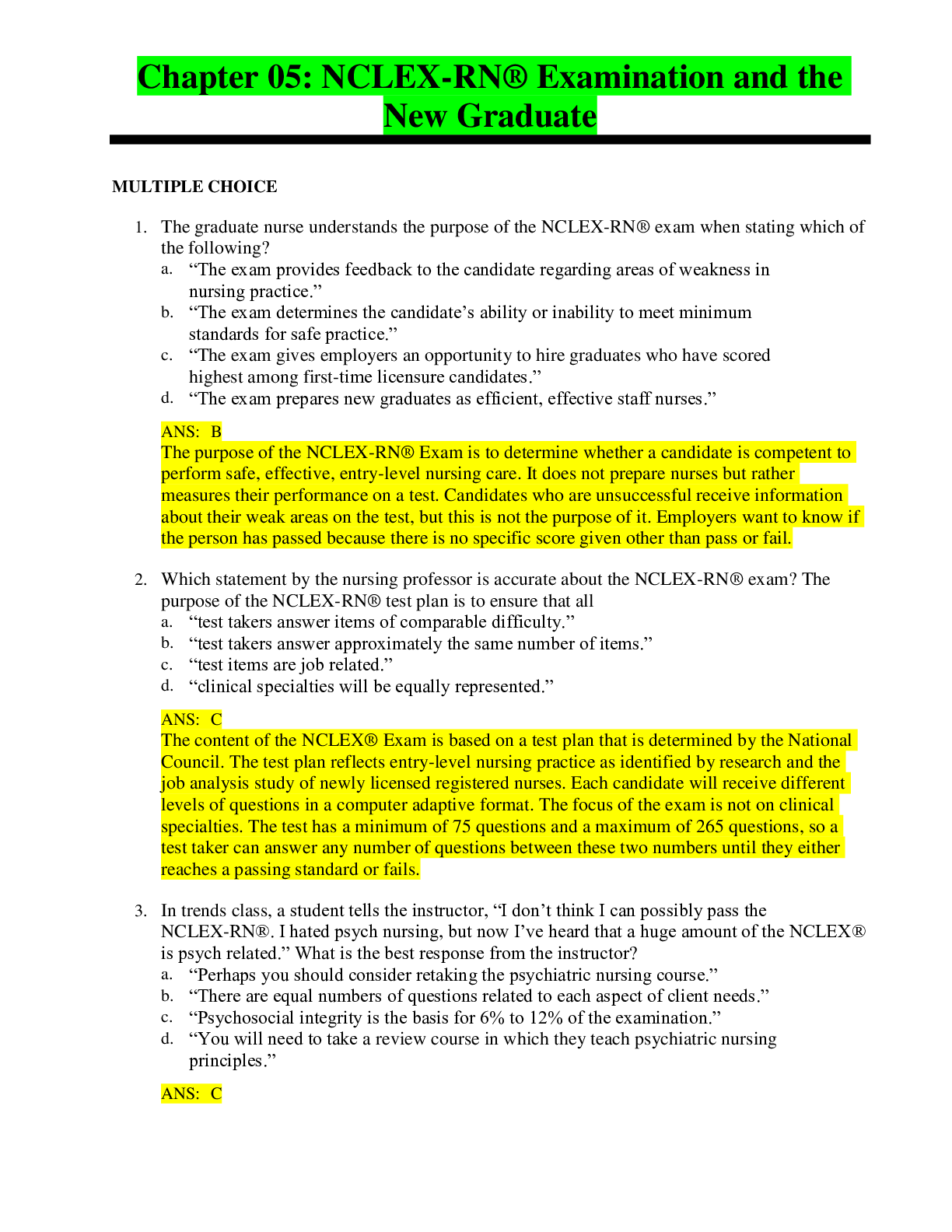
Buy this document to get the full access instantly
Instant Download Access after purchase
Add to cartInstant download
We Accept:

Reviews( 0 )
$5.50
Document information
Connected school, study & course
About the document
Uploaded On
Apr 24, 2020
Number of pages
14
Written in
Additional information
This document has been written for:
Uploaded
Apr 24, 2020
Downloads
0
Views
65

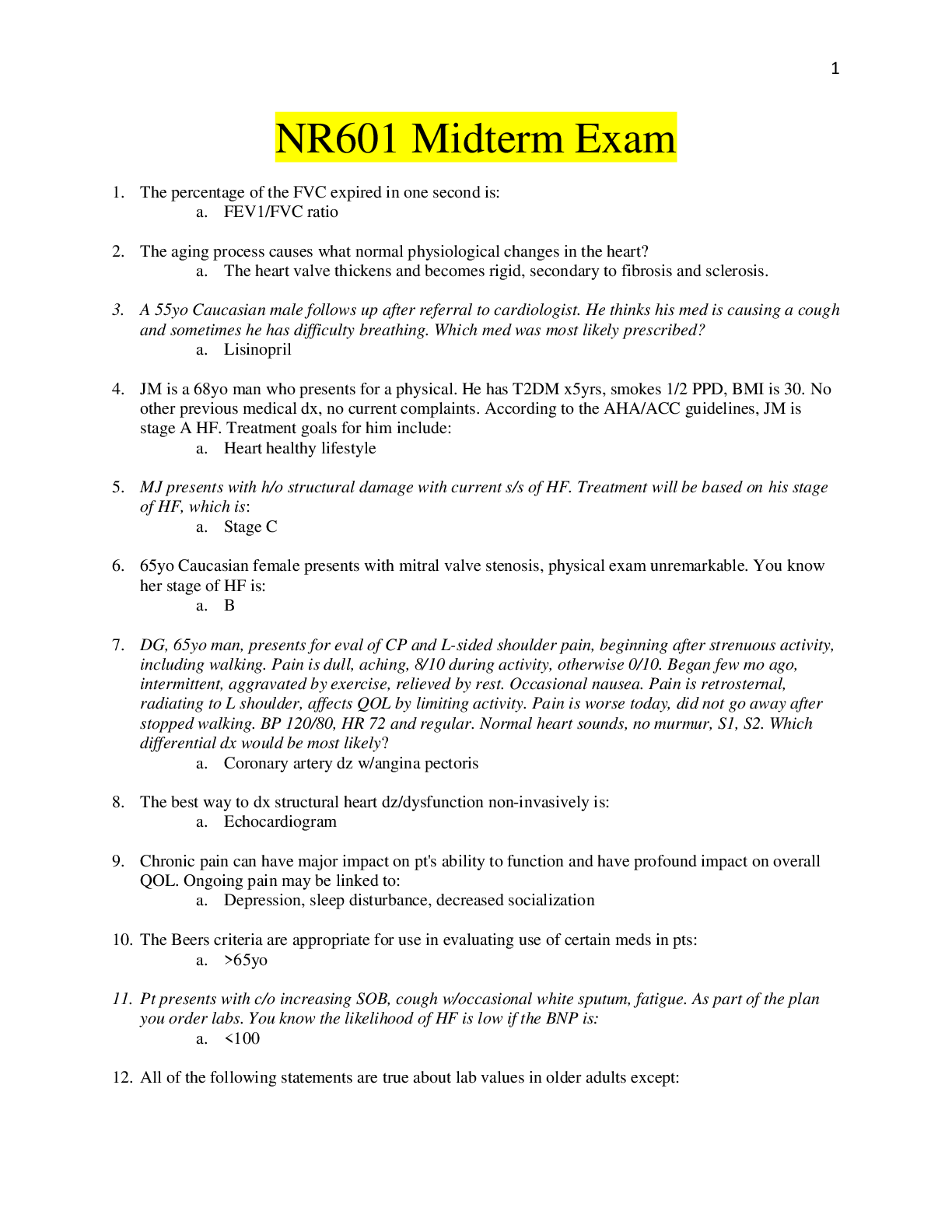
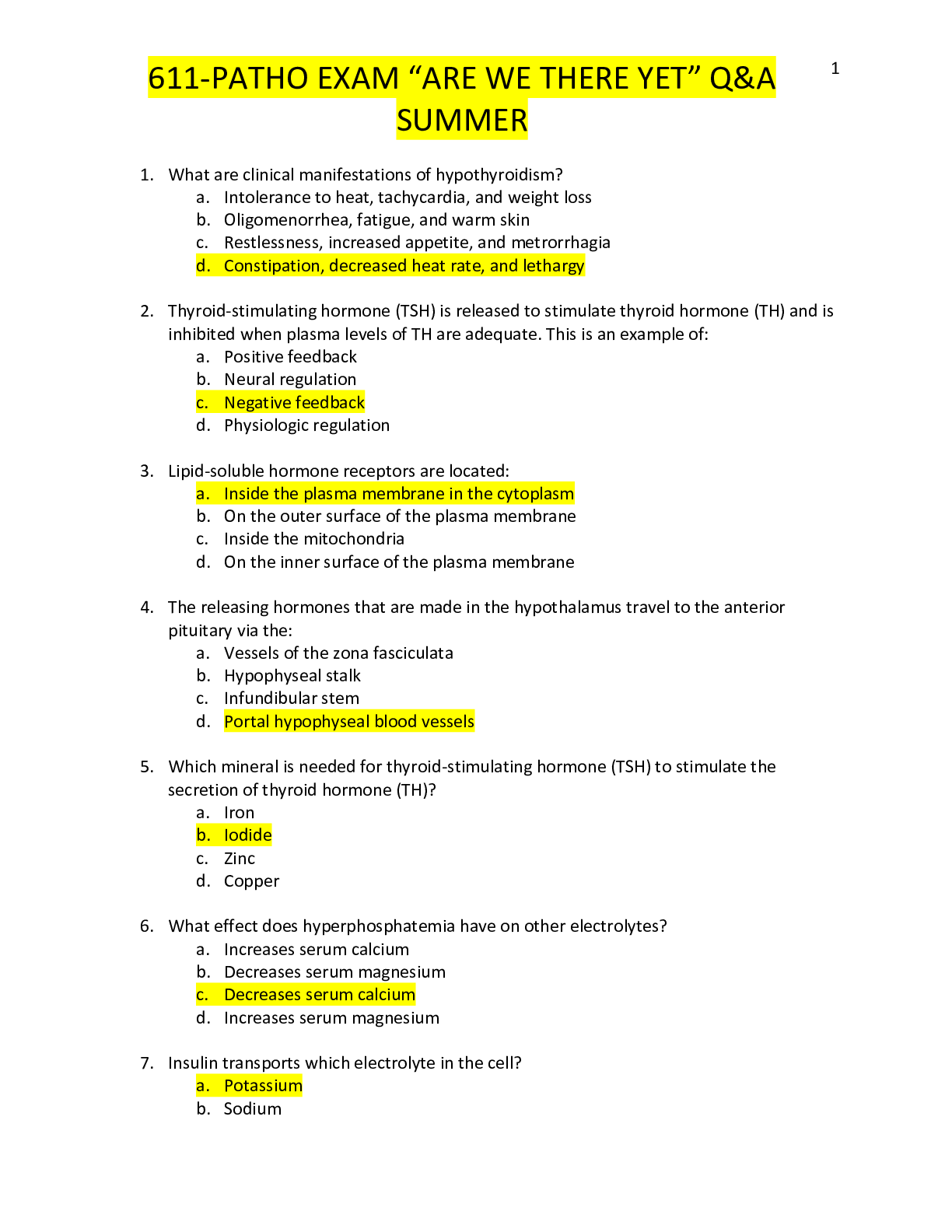
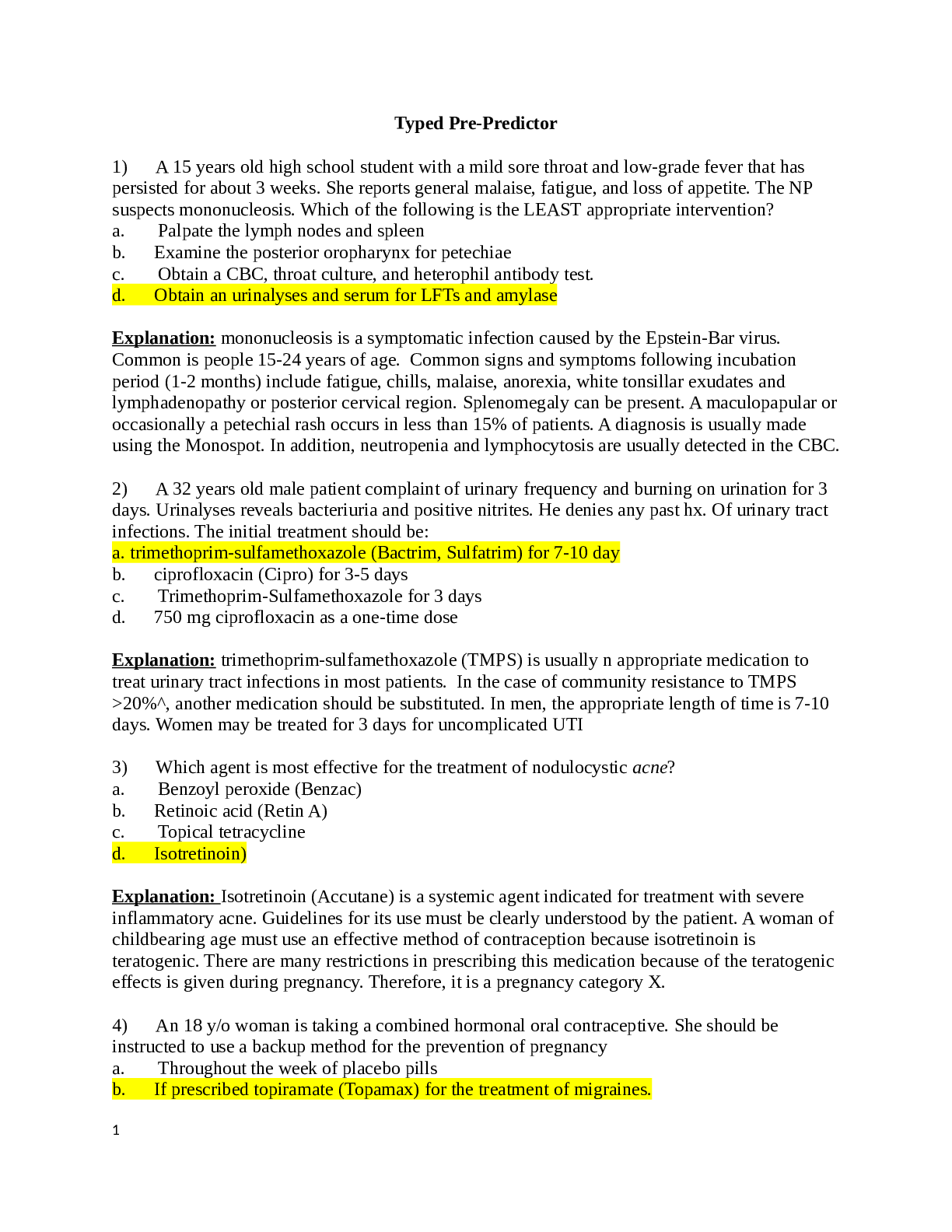
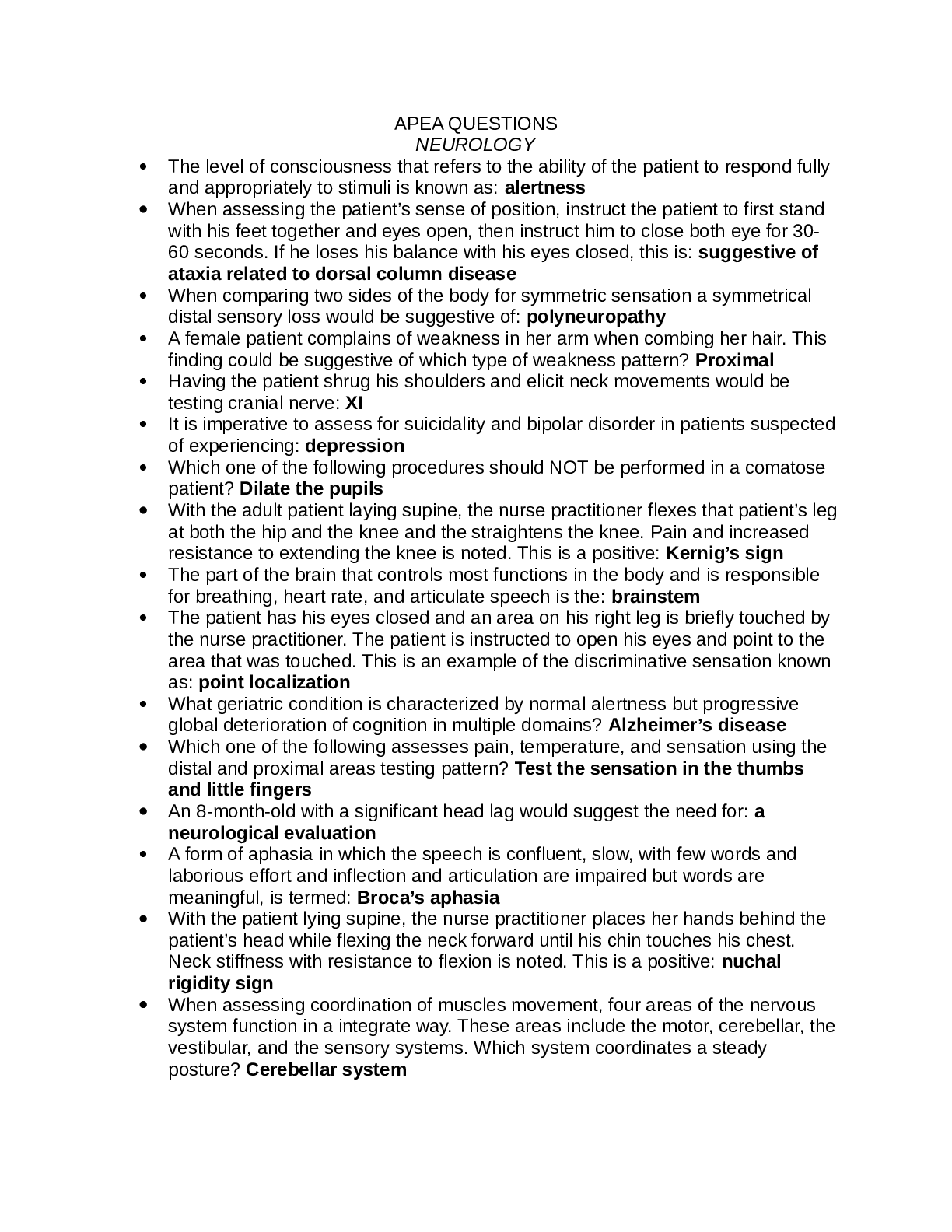
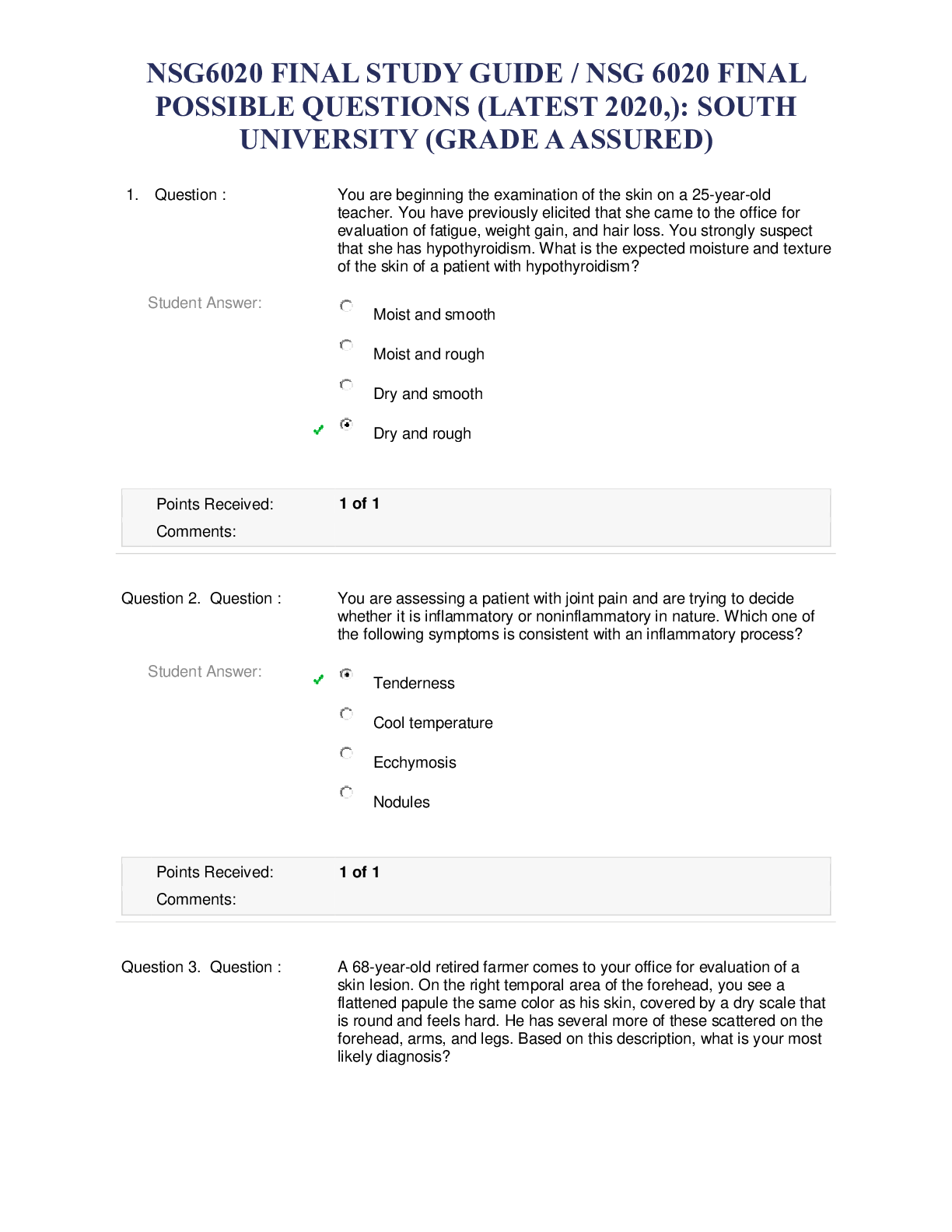
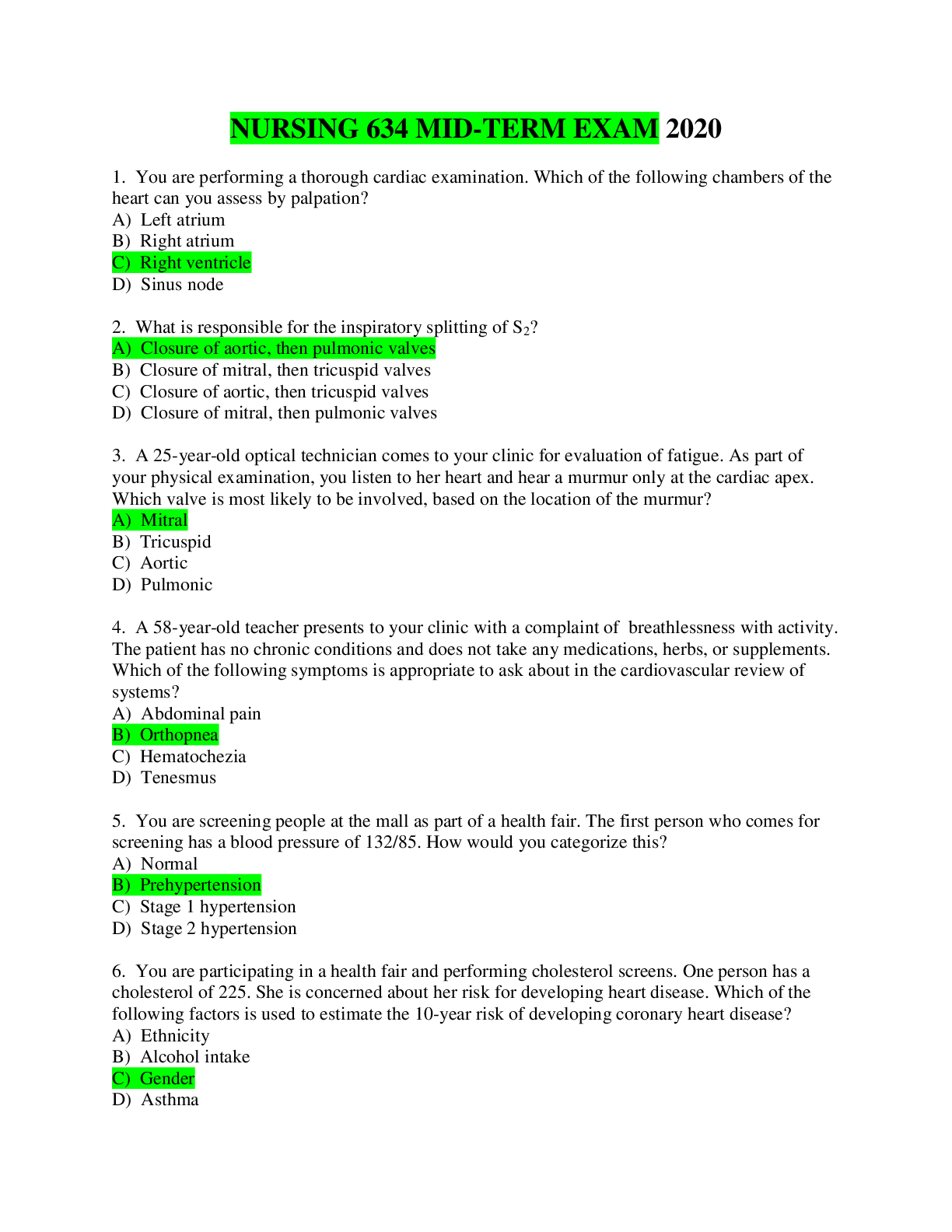
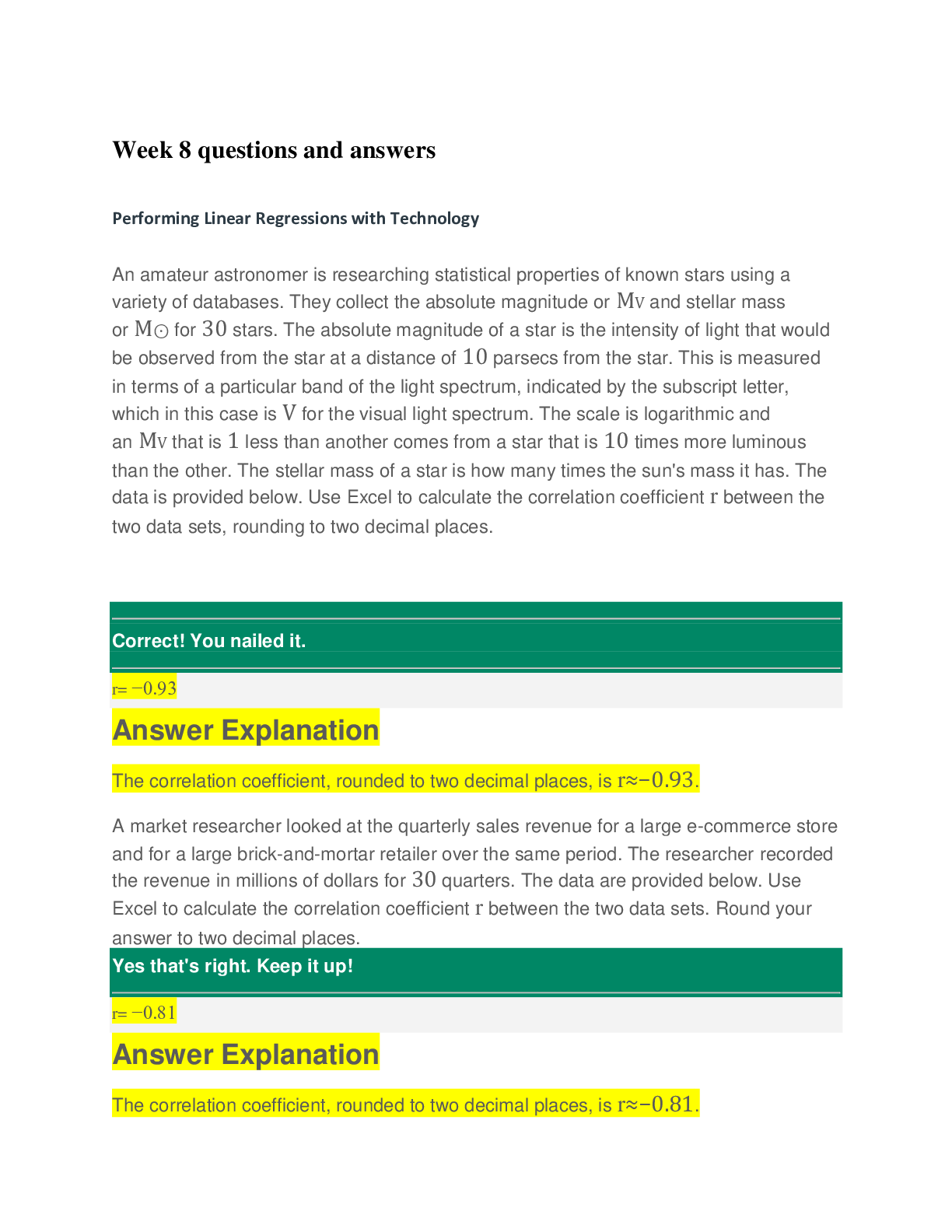
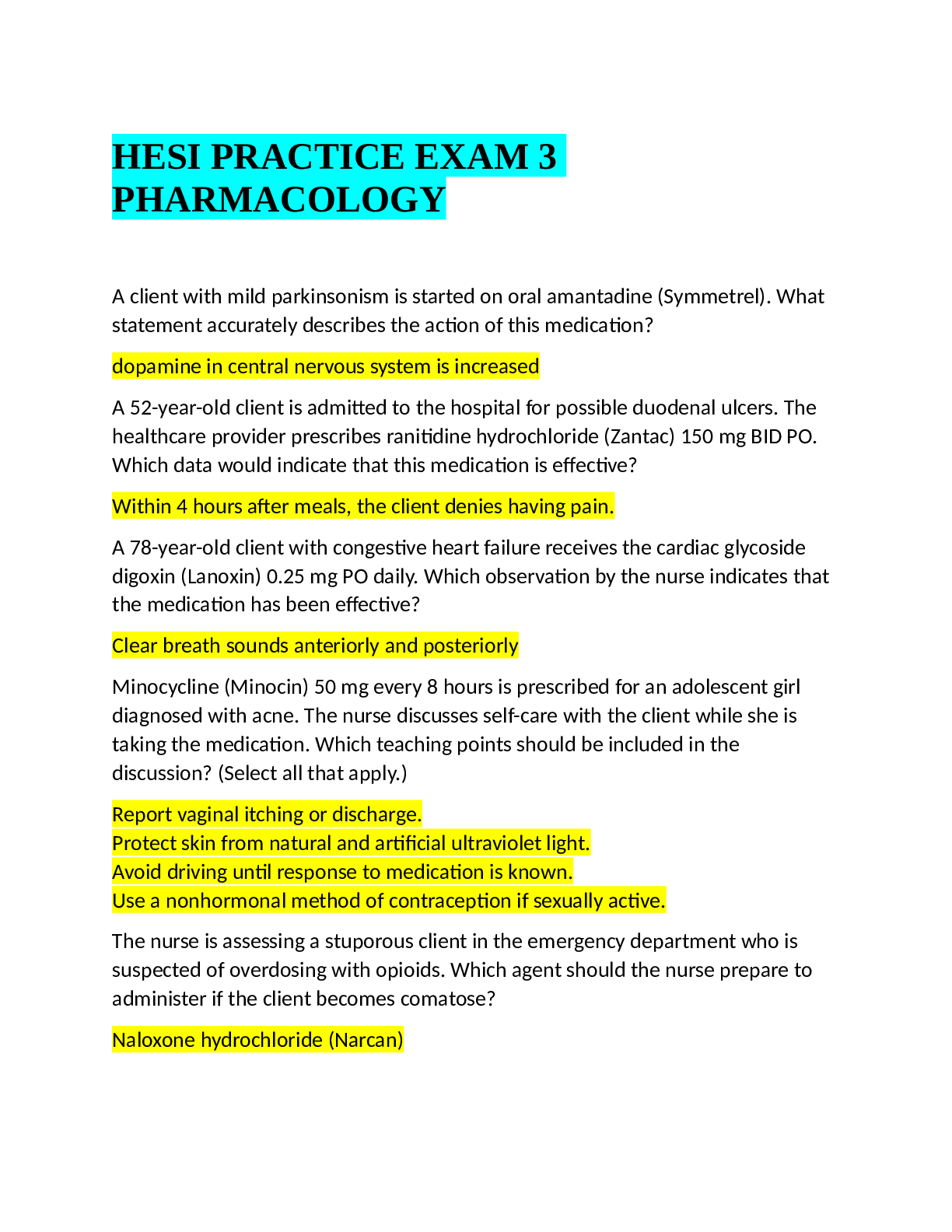
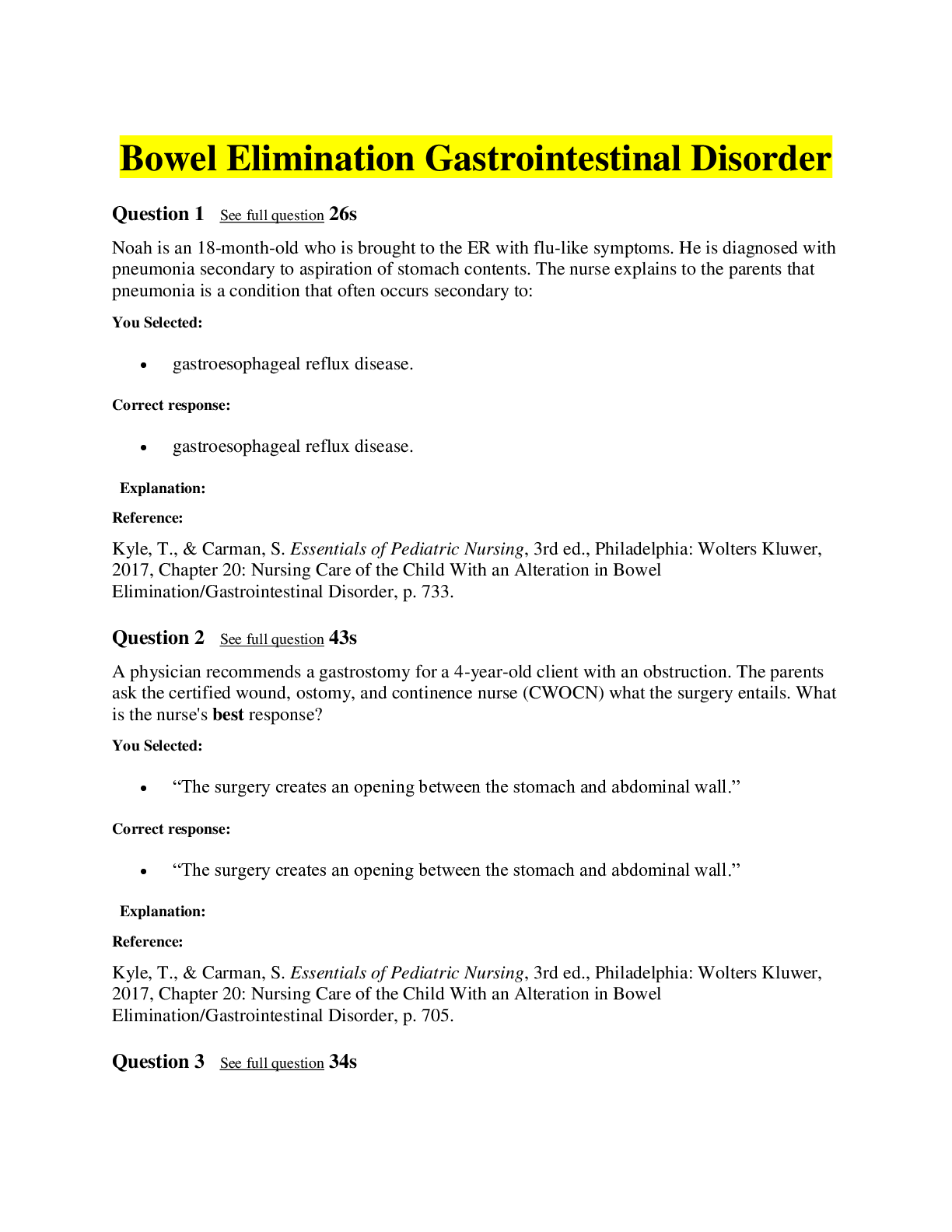

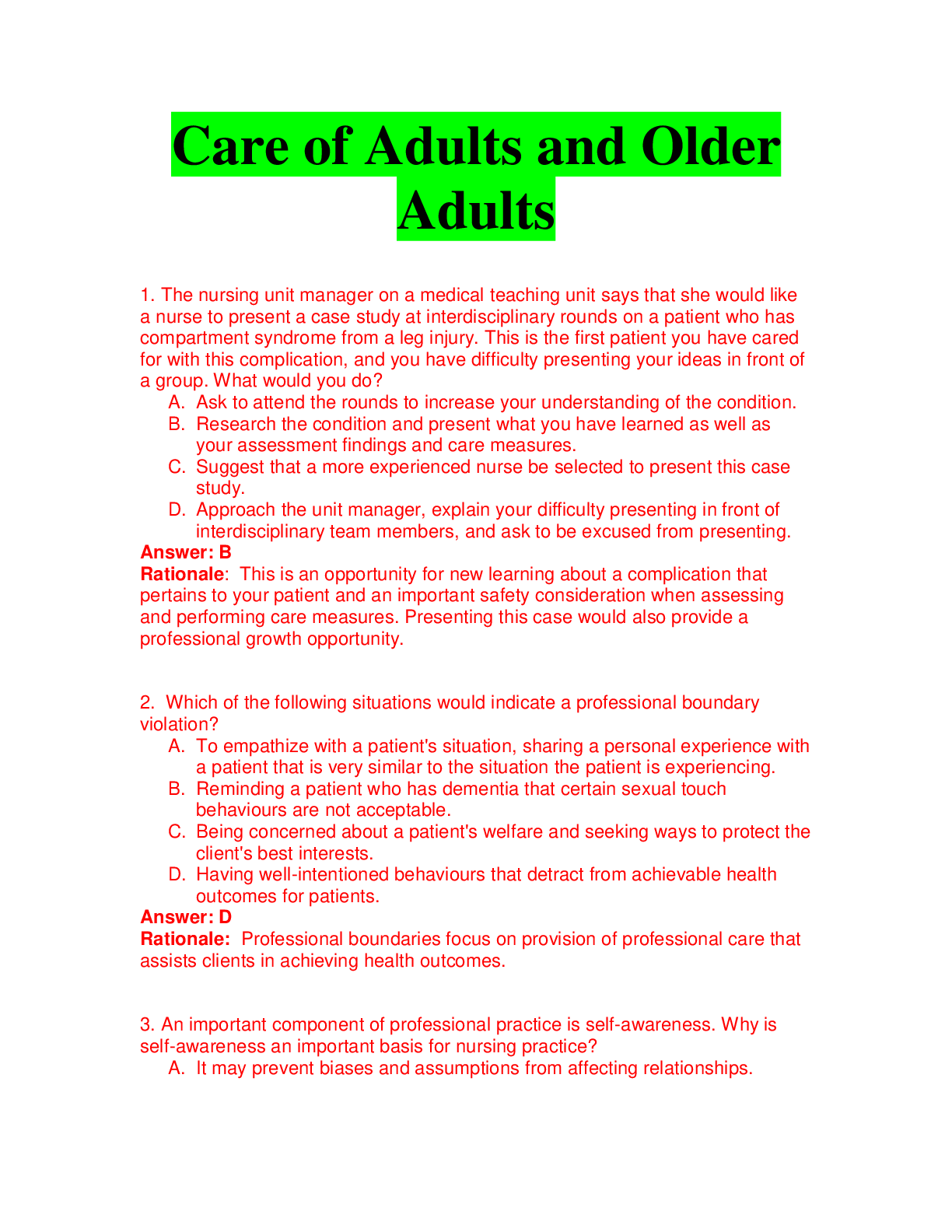
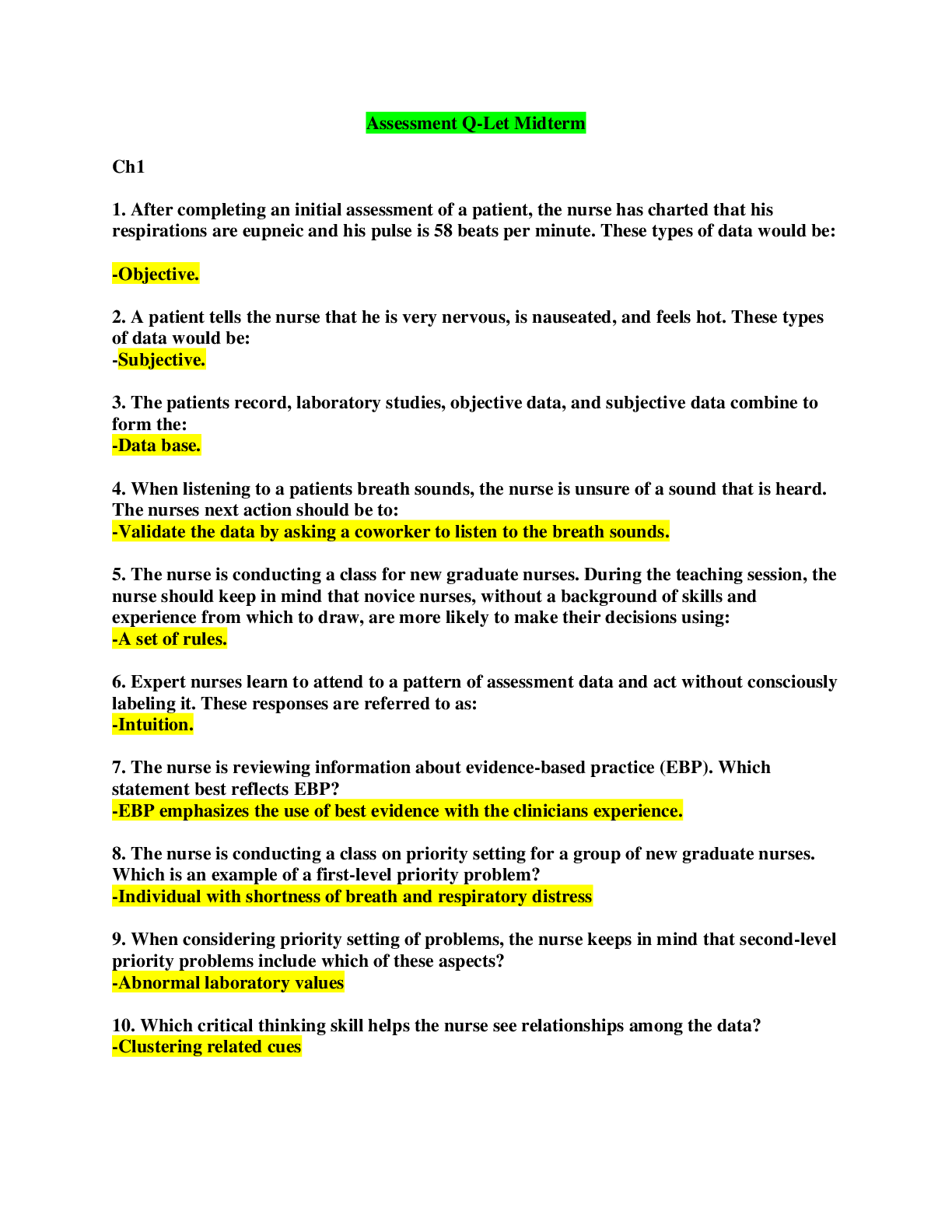
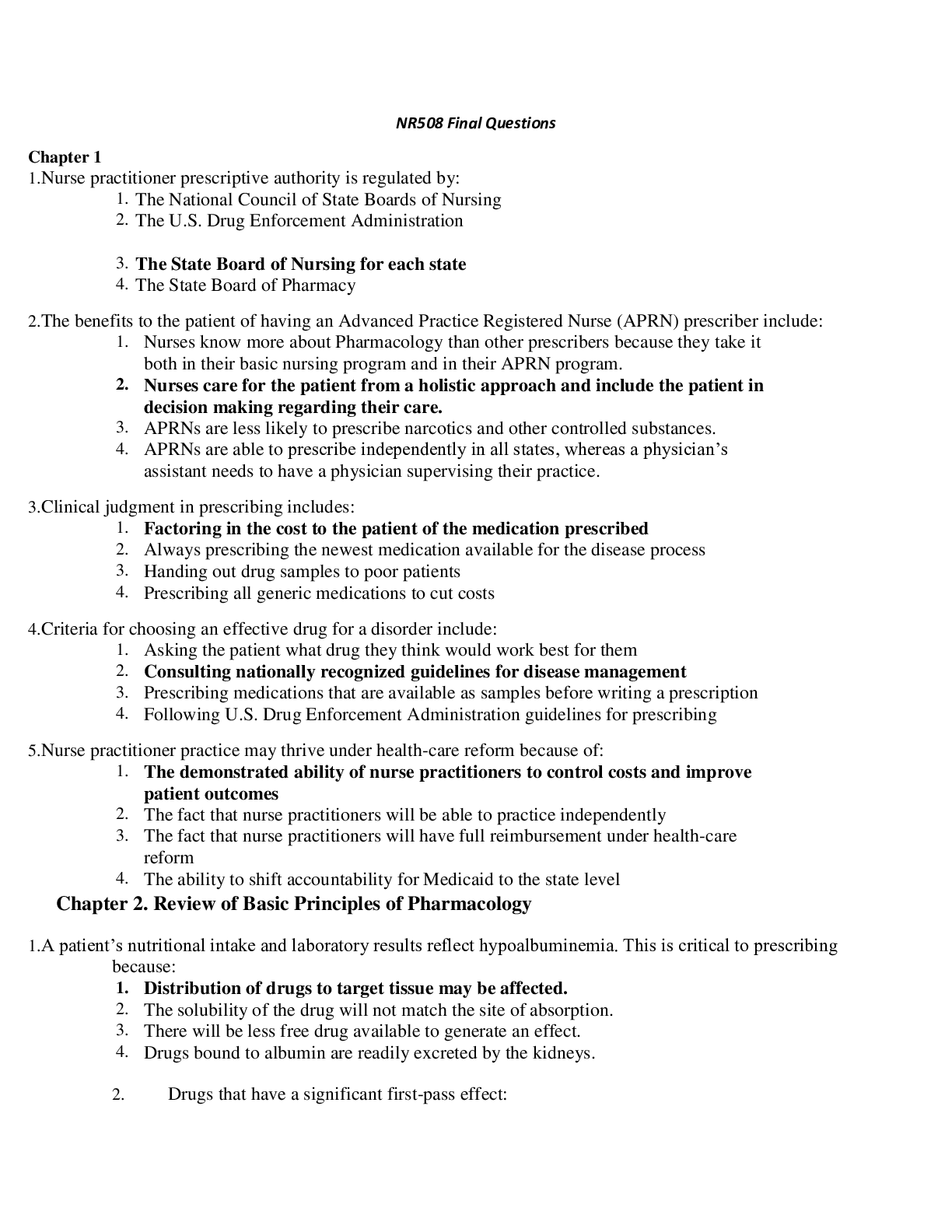
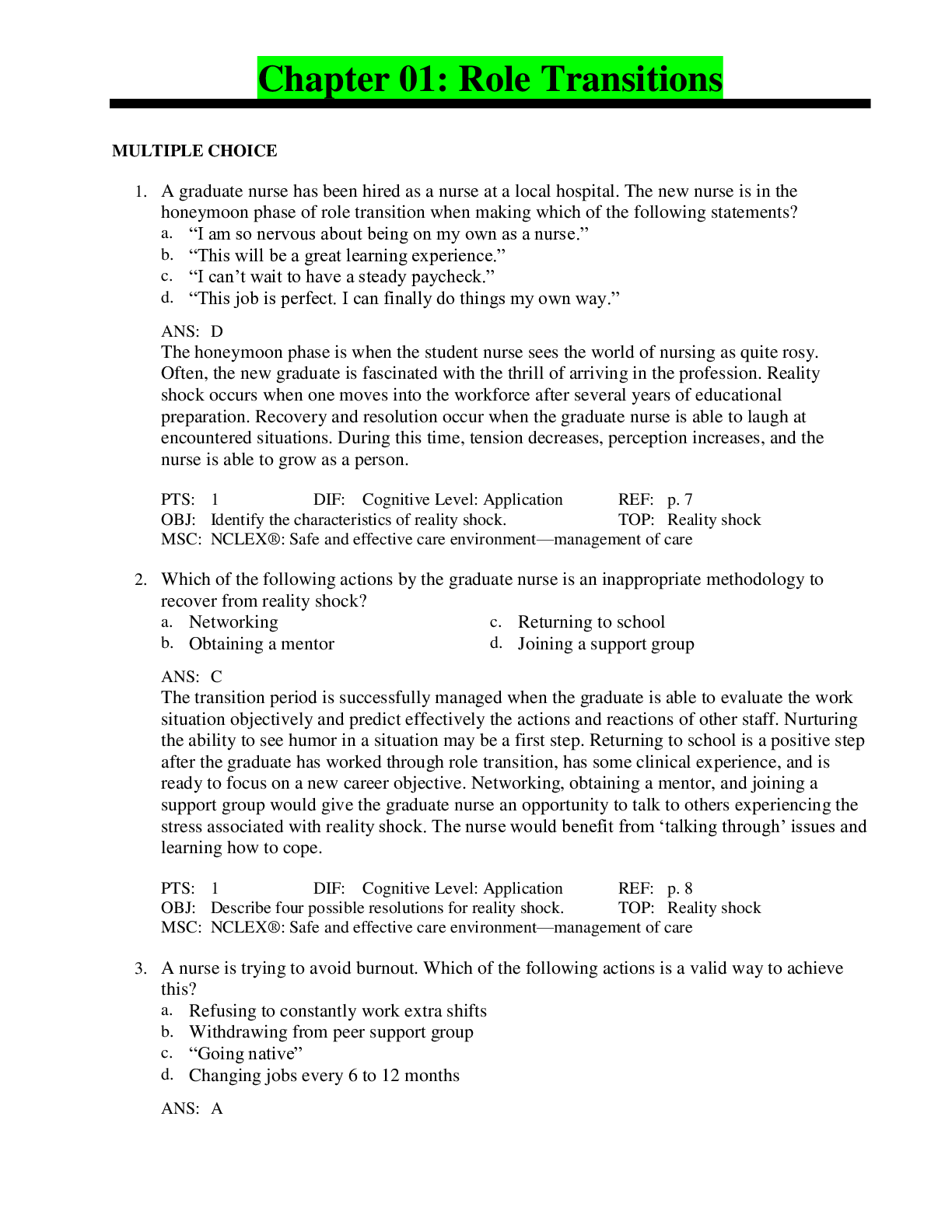

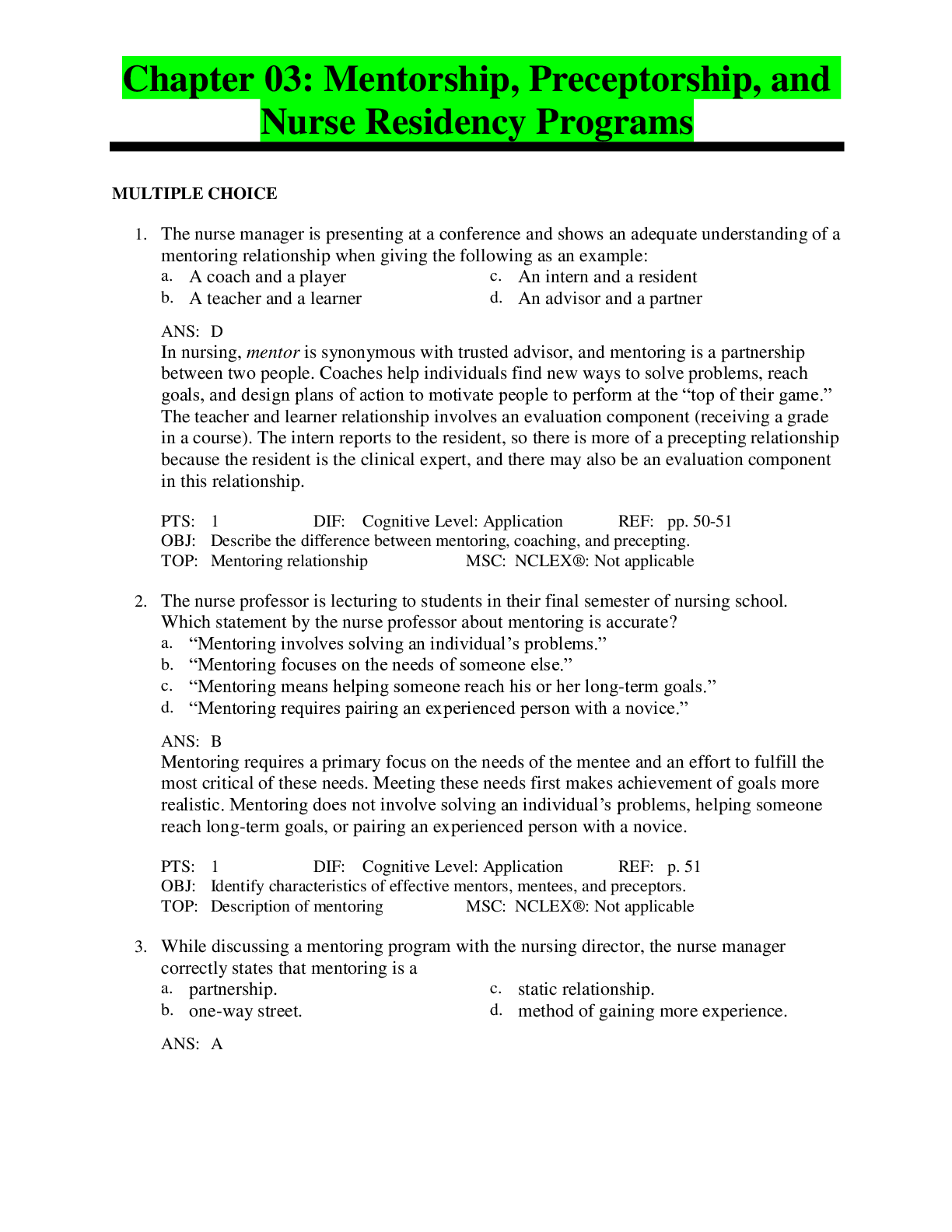
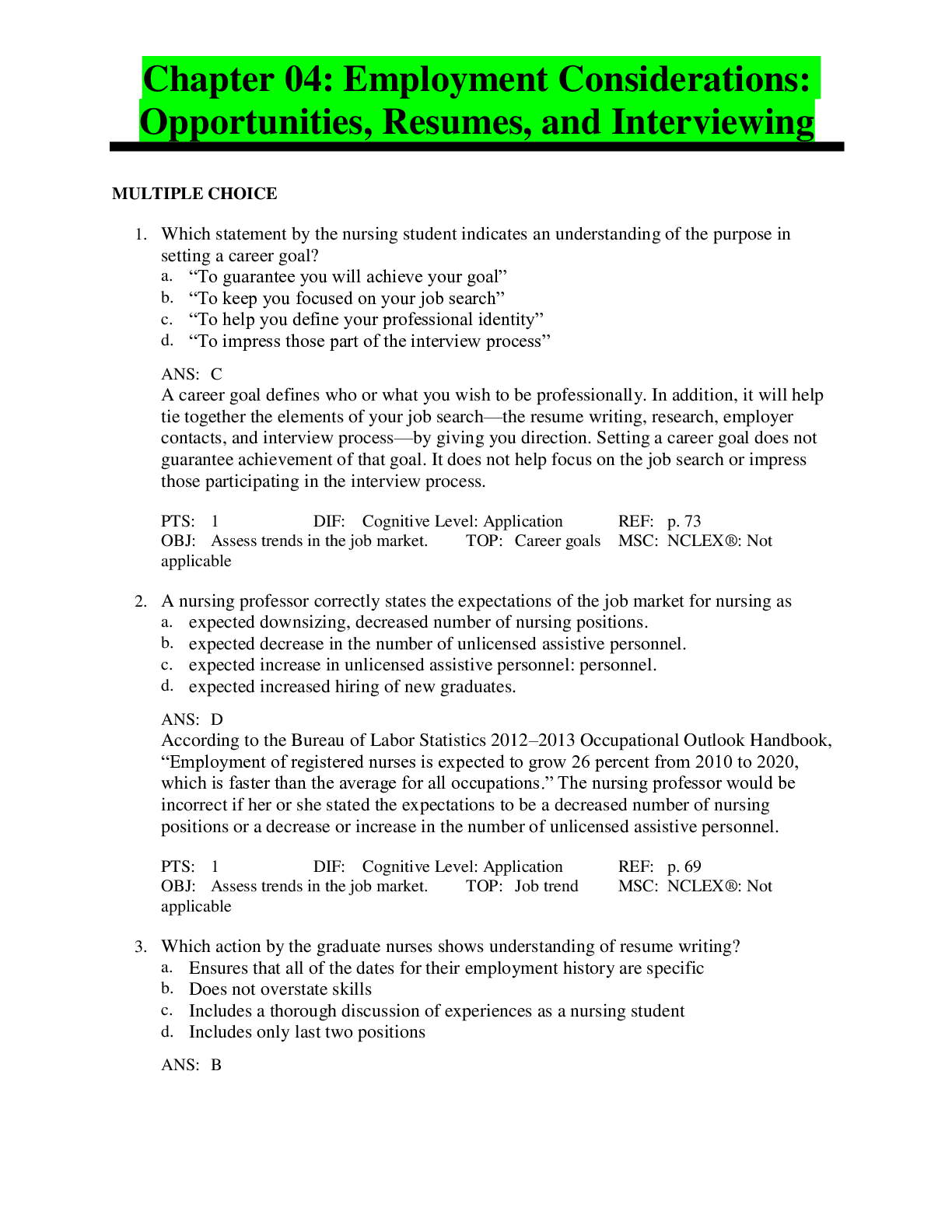

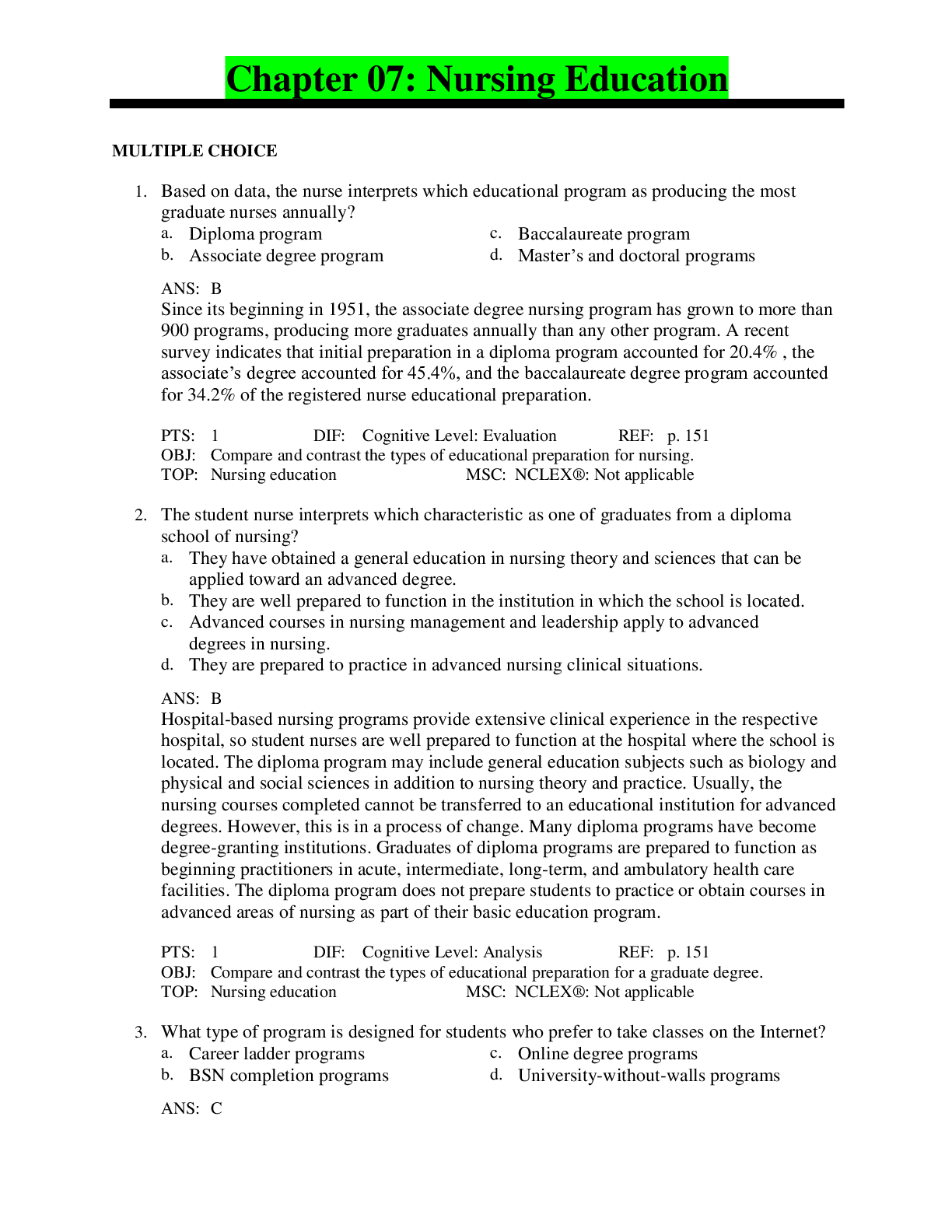

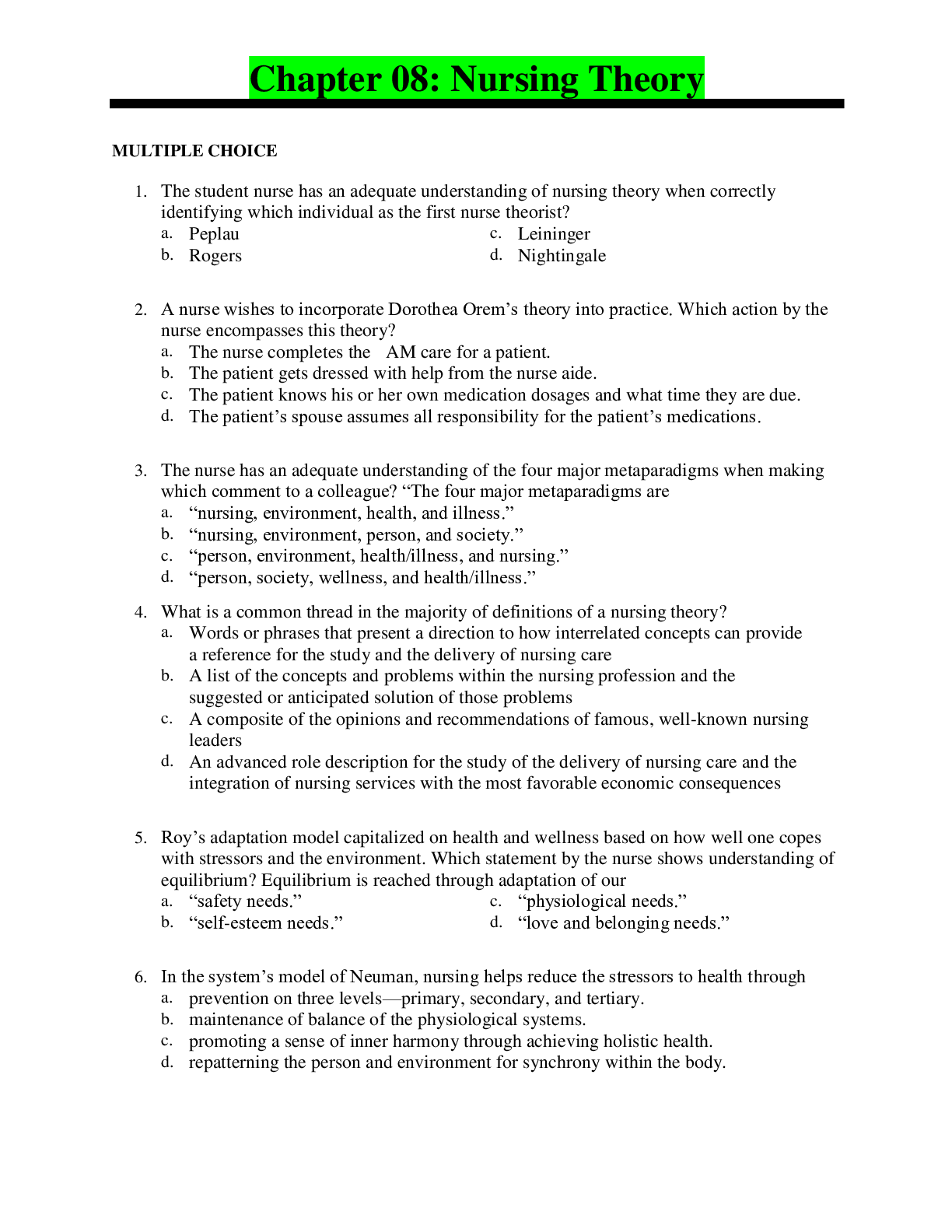
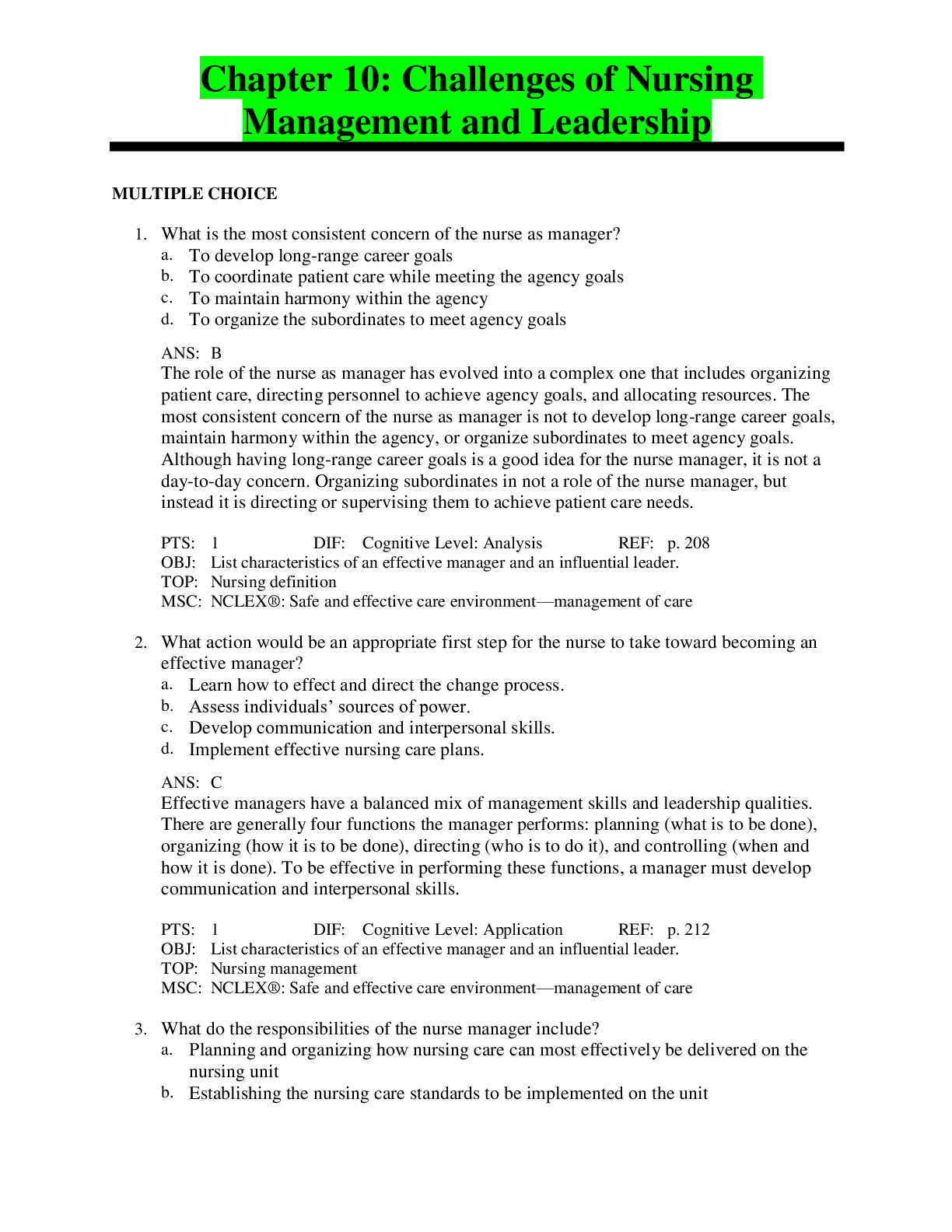
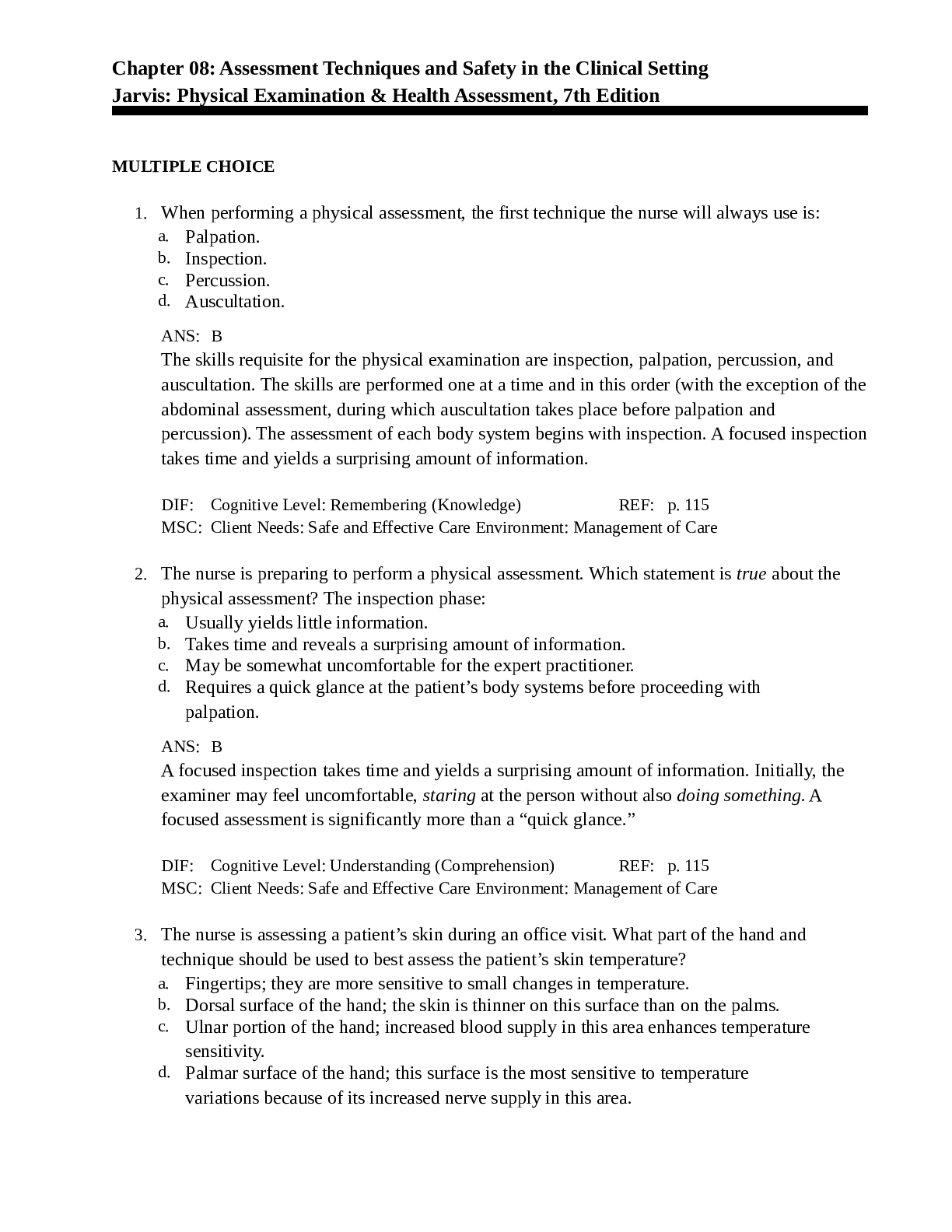
 (Latest 2021) Correct Study Guide, Download to Score A.png)

